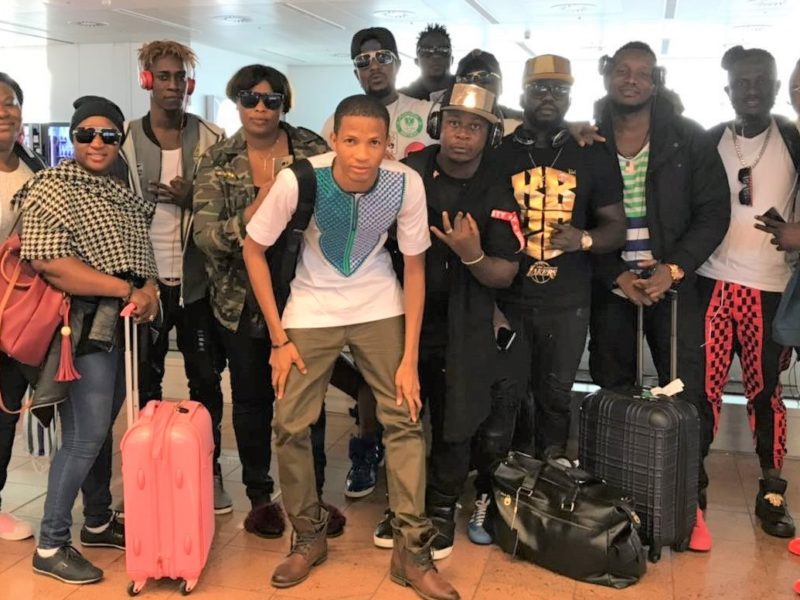Creative Development: Helping Sierra Leone by building Creative Industries
Africa’s popular musicians are crying out for help, often quite literally. In recent years, they have taken to the streets seeking redress for the failures of their countries’ legal systems to support creative activity effectively. The news brings reports of African musicians resorting to noisy street protests and personal confrontations with pirates in Ghana, Ethiopia, Kenya, Uganda, Botswana, and Swaziland. These musicians contend that their livelihoods are being destroyed by rampant piracy, corruption and the non–collection or diversion of royalties. Despite the many other problems of poor countries, the struggles of creators and creative businesses are worthy of attention. (Photo: Photo: Sierra Leone’s Refugee All Stars Musicians Seattle, USA)
As a graduate in Intellectual Property Management and Technology Transfer, this article makes the case that creative industries are a significant, but thus far largely unfulfilled, opportunity for less–developed countries like Sierra Leone. Where abundant creative talent exists but local circumstances are otherwise trying, creative industries may be one of the best bets for economic development. Creative sectors, particularly music, tend to rely less on sophisticated infrastructure or capital–intensive investment. Potential is particularly abundant in Sierra Leone, where musical creativity is rich, diverse, well loved, and constantly evolving while drawing on strong traditions.
For creative industries to prosper the legal and business environment must be supportive, but in this context, a supportive environment does not require massive, decades–long investment. I offer no grand, one–size–fits–all solutions. Not only have such solutions proven largely ineffectual, they are unnecessary. It would be more effective to concentrate on making the legal system, particularly copyright law, function more effectively and on removing obstacles from the paths of creators and entrepreneurs. Success will come from unleashing the genius and initiative of individuals.
A few essential reforms could provide Sierra Leone’s creators with a more stable and reliable environment to harness creativity. One of the first steps is enforcing existing intellectual property right commitments. However, the mere presence of laws is not enough. Creative sectors require a stable enabling environment, free from the most significant obstacles and policies that stifle and undermine individual initiative. I suggest a number of specific proposals to foster this enabling environment, without necessarily relying on financial assistance. These include a political commitment to prioritizing creative clusters, a focus on combating piracy that provides for effective remedies, a program for training judges, and a hands–off approach to private organizations that are essential in supporting sophisticated creative industries, such as collecting agencies and business associations.
I advocate specific, pragmatic reforms that could remove obstacles to using copyright to benefit local creative industries. Most discussions about intellectual property and development tend to center on high–level, somewhat abstract debates about technology transfer, relations between rich and poor countries, the fairness of the international intellectual property system, and concerns about distributive justice. The policy initiatives that get the most attention occur at the level of international institutions like the World Intellectual Property Organization (WIPO) and the World Health Organization (WHO). Whatever the merits of these debates, they do not focus on making the most of the available local resources and the laws that countries already have. One would do well to focus also on specific reforms that could use copyright and creative industries to help poor people by removing obstacles at the local level.
Fostering a local music industry in Sierra Leone in the ways I advocate here is such a project, as it encourages creators and entrepreneurs to build local businesses based on local strengths and tastes. Crucially, these important reforms will not only help creators by providing them with the right conditions to prosper. They will also generate important ripple effects that will further contribute to entrepreneurial activities in Sierra Leone. A successful creative industry alone is neither sufficient nor necessary to a thriving economy, but it is exactly the type of private, locally–based entrepreneurial effort that developing economies need to foster. The development of creative sectors is not a panacea, but the stable institutional environment which empowers all entrepreneurs and provides the foundation for growth elsewhere.
Despite a few celebrated examples on the world music scene such as King Sunny Ade, Ali Farka Touré, Youssou N’Dour, Jimmy B, Emerson and many celebrated musicians in Sierra Leone, African music has yet to become a successful export industry. For example, Senegal is justly celebrated for its illustrious artistic history and for relatively well–known stars such as N’Dour who have been able to transform their musical roots to international success in outside markets. The relatively successful South African music business boasted a high of 22%, but the next most successful country was the Democratic Republic of Congo with only 8%.
Although African creators do succeed, their success often fails to produce economic benefits for their home countries. For example, most African music is recorded in either London or Paris—largely depending on where the artist in question originates. Those products are also most often consumed in Western countries as well. African musicians are often poorer than their countrymen. The Africa Music Project estimated average income for musicians in Senegal was $600 per year—about 15% lower than the country’s gross domestic product per capita. The study further observed that eighty percent of Senegalese musicians are either unemployed or underemployed.
Piracy levels in sub–Saharan Africa are high, even by the low standards of the world’s emerging markets. Pirated versions of creative works represent at least 25% of the entire marketplace across Africa. That figure is as high as 90 percent in Sierra Leone. Throughout sub–Saharan Africa, there are ineffective enforcement regimes even though the copyright laws are of a strong disposition.
In Sierra Leone the decline in the creative industry as a systemic failure of both the public and private institutions that should be combating piracy: “Inadequate funding of enforcement agencies; lack of trained and properly motivated staff ( copyright offices); stakeholder apathy in the enforcement of their rights; a weak institutional base; poorly trained and paid enforcement (police, customs, and specialized institutions) agents; a cumbersome and tardy judicial systems; and unorganized stakeholders. In essence, the pirates are better organized and more successful than either their victims or those tasked with combating them.
Piracy also hampers individual musicians from securing capital to finance their creative work or other ventures. Their primary potential assets—their copyrights and the revenue streams that should result from them—are effectively worthless. As a result, musicians are unable to obtain loans from local financial institutions, thus forcing them to pay for instruments, recording time, and other business expenses up front and out of their own pockets.
A well–functioning, robust music industry creates many creative and financial opportunities for creators besides selling recordings and earning royalties from sales. Many of these opportunities are facilitated by licensing. Composers and musicians license their work for broadcast on radio and television, for cover versions of songs, for inclusion in movies, television, and advertising, and increasingly for derivative uses like the creation of remixes and ring tones. All of this activity expands creative clusters, making them even more significant and beneficial to creators and the local economy.
Unfortunately, most Sierra Leoneans musicians are not enjoying the benefits of licensing their music. Some of this failure results from shortcomings in the legal system, but the real problem regarding licensing is the lack of effective, dependable collective rights organizations. Collective rights organizations are the mechanism employed in much of the developed world to secure payment for artists for various small uses of their works.
About the Author: Joseph S. Sherman is the Editor-in-Chief of The New Daily Nation (www.thenewdailynation.com ). He holds Master degree in Intellectual Property from Franklin Pierce Law Center in Concord, New Hampshire, USA. He specialized in Copyright, Trademark, Intellectual Property Management and Technology Transfer. Upon completing his PhD, he plans to open a consulting firm to advocate for Intellectual Property Rights.
By Joseph S. Sherman, Editor-in-Chief, New Daily Nation
Stay with Sierra Express Media, for your trusted place in news!
© 2011, https:. All rights reserved.






